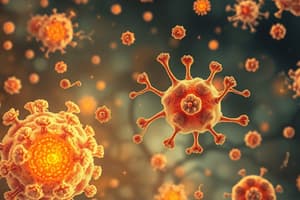Podcast
Questions and Answers
What is antigen
What is antigen
It is a molecule found in the surface of microorganisms that triggers immune response
What is antibody
What is antibody
It is a protective protein that the produced by B cells as a response to a specific antigens
What is the importance on the knowledge of antigens and antibody
What is the importance on the knowledge of antigens and antibody
- Vaccine development. 2. Blood transfusion and organ transplant. 3. Diseases diagnosis and treatment 4. Autoimmune diagnosis. 5. Allergy testing and management. 6. Forensic and paternity testing
What is the chemical nature of antigens
What is the chemical nature of antigens
What is complete antigens
What is complete antigens
What are incomplete antigens
What are incomplete antigens
What re the determinate of immunogenicity
What re the determinate of immunogenicity
What are the types of antigens
What are the types of antigens
Describe the structure of antigens
Describe the structure of antigens
What the functions of antigens
What the functions of antigens
What are the types of antibodies
What are the types of antibodies
Describe the structure of antibodies
Describe the structure of antibodies
What are the function of antibodies
What are the function of antibodies
Flashcards
Antigen
Antigen
A molecule on microorganisms that triggers immune response.
Antibody
Antibody
A protective protein produced by B cells to fight specific antigens.
Importance of Antigens and Antibodies
Importance of Antigens and Antibodies
Key for vaccine development, blood transfusions, and disease diagnosis.
Chemical Nature of Antigens
Chemical Nature of Antigens
Signup and view all the flashcards



